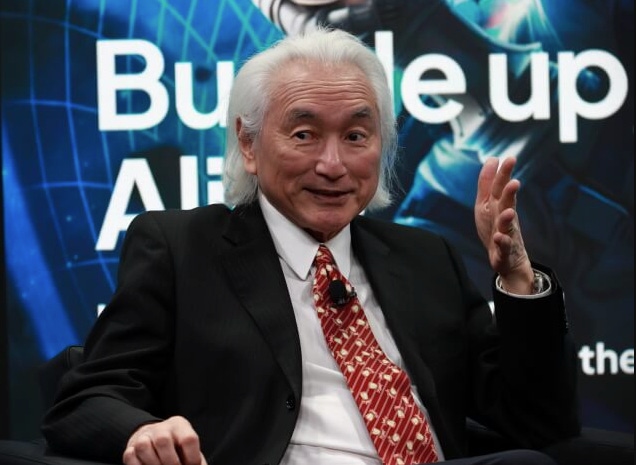Famed theoretical physicist spoke about generative AI’s limits and how quantum computing might create a landscape of obsolete, desiccated technology in its shadow.

The potential omnipotence of quantum computers and the moral limits of generative AI were central to a fireside chat last week between noted theoretical physicist Dr. Michio Kaku and Ensono CMO Jonathan Bumba.
The duo sat down together at an event hosted by Ensono’s Maven Report, of which Bumba is editor-in-chief.
Kaku, a frequent guest on TV shows and other programs that promote science, currently serves as professor of theoretical physics at the City College of New York and the CUNY Graduate School. During the fireside chat, he shared some of his early inspirations in science, including his interest in Einstein’s unfinished Theory of Everything to understand the universe. The challenge with the theory has been solving proposed equations that might explain the particles of the cosmos like musical notes and with the universe being a symphony, Kaku said.
“Quantum computers may be powerful enough to solve these equations,” he said, and in theory, this would explain why the universe is the way it is.
Discussing quantum supremacy and points beyond, Kaku said Google and China have seen results in the space with quantum computers exceeding digital computers by factors of millions of times, yet the technology is still not for general purpose. “That’s the next step,” he said. “We haven’t reached that point yet. It’s a horserace.”
A Tech Race to Outpace Rust and Obsolescence
Current leaders in the space include China, Google, and IBM but not too far behind are Honeywell and Microsoft, he said. “What’s at stake is the future of the world economy.” The leader who dominates this in this space could influence the world economy.
“The nation or the company that dominates this next race will influence that state of the world economy,” Kaku said. “In other words, Silicon Valley will become a rust belt. It will be a rust belt of obsolete technologies.” That is why companies in Silicon Valley are jumping into the quantum computing game, he said.
China is leading in one aspect of quantum computing development, Kaku said, by using light rather than electricity. The advantage there is light-based hardware does not need to be cooled down; however, he said, it is clumsy compared with traditional components. “With electronics, you can get very, very precise transistors that are almost atomic in size,” Kaku said. “With mirrors, you have to have a huge collection of mirrors and beam splitters to make the laser beam work. However, never underestimate the Chinese.”
AI Speaks Up
Another technology development reshaping multiple industries in a short time is generative AI, which Bumba framed during the discussion. “If you look back to November 30 of 2022 when ChatGPT was launched, it went from zero to 100 million users in 60 days. For the first time ever, AI was democratized.”
Though ChatGPT and its emerging rivals have wowed many people, Kaku said these AI-powered chatbots have not yet passed the Turing test for showing intelligence on a par with humans. Since generative AI aggregates, repackages, and regurgitates information it has been fed rather than personal experience, simple questions such as what it ate for dinner last night or if it had ever been kissed can stump the machines, he said.
There are other issues with chatbots, Kaku said, such as their inability to tell the difference between truth and falsehood or between right and wrong. “They have no moral direction whatsoever,” he said. “Everything’s the same because they mine the internet.”
For example, chatbots might grab any material it finds and incorporate it into its answers without any barometer for its veracity or merits. “The weak link in this software is fact checking.” Kaku said. “You need a fact checker to check the work of a chatbot.”
That fact checking power is where hardware could come in, he said, to supervise chatbots.
What Kaku was not keen on is government stepping in to regulate chatbots the way other sectors have been overseen. “We want the industry to be self-policing,” he said. “We don’t want bureaucrats to come in and grandstand so they can get re-elected.”
Dark Side of Innovations
The rise of these tech wonders does bring up some cautionary considerations. With great quantum computing power also comes great responsibility, as Spider-Man creator Stan Lee might say, because the possible impact on national security.
“If you can create a quantum computer that powerful, it could break any known digital code,” Kaku said. A fully operational quantum computer, in principle, would have enough power to undo the current security codes that governments and private institutions rely on. “The crown jewels of any nation, any security agency -- the secrets, the nuclear codes -- everything is susceptible to be cracked,” Kaku said.
That would include cryptocurrency and banking transactions, he said.
Rampant, unchecked technology might even lead to existential threats that sound like science fiction but could be made real. Chatbots and other AI-powered resources, for instance, could potentially be used to impersonate heads of state to issue bogus declarations. Development of guardrails may have a real necessity for future developments. “What happens if a chatbot impersonates Vladimir Putin and declares war on NATO?” Kaku asked. “We have to make sure there are safeguards so that technology doesn’t go crazy.”
When asked an audience question whether the development of AI smarter than humans or contact with intelligent extraterrestrials would pose a greater threat or opportunity to humanity, Kaku said the arrival of aliens might have a substantial impact -- if we could understand each other, presuming vast differences in intellect. “How would they view us?” he asked. “If you’re walking on a country road and see a squirrel, do you go down to the squirrel and say, ‘I give you trinkets; I give you beads; I give you walnuts -- take me to your squirrel queen.’”

This squirrel would neither confirm nor deny the existence of a "Squirrel Queen." / Photo by Joao-Pierre S. Ruth
What to Read Next:
OpenAI CEO Sam Altman Pleads for AI Regulation
ChatGPT Is the Tesla of Generative AI
Beyond Hype: How Quantum Computing Will Change Enterprise IT
Is It Time to Start Worrying About Quantum Computing Security?
Read more about:
Quantum ComputingAbout the Author(s)
You May Also Like







